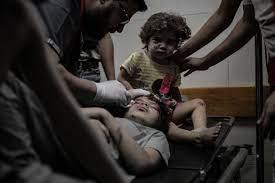Zarrar Khuhro
Genocide is not an event; you don’t simply wake up one morning and begin exterminating an entire people out of the blue. Genocide is a process; you have to work your way up to it. And like all processes, genocide has its stages – 10 stages in all if we are to refer to the list prepared by Dr Gregory Stanton, founding president and chairman of Genocide Watch, an organisation that does exactly what its name implies.
One of those stages is dehumanisation. This is an important one because committing genocide is not easy; murdering men, women and children in thousands tends to take a toll on the psyche, causing one to perhaps face all kinds of uncomfortable questions, to counter all manners of unwelcome thoughts that intrude into even the most closed of minds like single spies sneaking into a well-guarded fortress. Those who pull the trigger on children, those who drop bombs on schools and hospitals, are after all presumably as humans as the ones they murder. How then, one wonders, do they sleep at night? How do they not see the blood on their hands every waking moment, like Lady Macbeth wandering the halls of the Dunsinane castle? The answer is simple; you live with it by convincing yourself that those being killed are not in fact human, or at the very least not as human as you are. If you do that right and repeatedly, you will successfully convince yourself that murder is not murder; it’s pest control. Dehumanisation has to be an ongoing process, running concurrently with the actual extermination because, you see, it is not just your own public you have to convince, it is also the governments and publics of the countries that are arming, aiding, abetting and, in some cases, cheering you on while you go about your bloody but necessary business. This gets harder to do as eviscerated babies pile up in the courtyards of besieged hospitals, as body bags choke the streets, and as the world livestreams the apocalypse on smartphones.
It’s in this context that last week’s infamous Washington Post cartoon must be viewed. On November 6, as Israel continued its deliberate and direct targeting of civilians in Gaza in bakeries, hospitals and homes, while clearly announcing its intention to eradicate the Palestinians, The Washington Post published a caricature titled “Human Shields”. The caricature depicts a man with bestial features in a dark, striped suit, which has Hamas in bold white letters emblazoned on it. His comically large nose is jutting out from beneath sunken eyes crowned by bushy eyebrows.
He has several children and a typically helpless-looking abaya-clad Arab woman tied to his body. To his left is a Palestinian flag and to his right a partial image of Al-Aqsa and, of course, an oil lamp. Just in case the symbolism was not clear enough. The cartoon ticks many boxes. In his landmark study on dehumanisation, scholar Nick Haslam writes that among the categories of dehumanisation by imagery are depictions of the enemy as a barbarian, a criminal and a harasser of women and children.
The outrage was immediate and effective; having removed the cartoon, the editor of the editorial page, David Shipley, wrote in a note to readers that while he saw the drawing purely as a “caricature” of a “specific Hamas spokesman”, the outrage convinced him that he had “missed something profound, and divisive”. It’s not David’s fault, really. Like so many people across the world he’s grown up with media and film depictions of hooknosed Arabs as either bumbling sheikhs, bumbling bandits, or else brutal (and bumbling) fanatics. This is a phenomenon author Jack Shaheen wrote about extensively in his book Reel Bad Arabs: How Hollywood Vilifies a People, which was later made into a documentary.
Coming back to cartoons, Arabs are not the only ones to get this treatment – far from it. Nazi Germany was replete with images (they’re just a Google search away) which depicted Jews in much the same way: Their eyes are beady and their noses are hooked or bulbous, sometimes both. All precisely calculated to produce revulsion in the viewer, to separate the righteous “us” from the bestial “them”. Take a cursory look at anti-Japanese propaganda cartoons in World War II, some drawn by none other than famous children’s author Dr Seuss, and you see the same techniques applied. Anti-Irish cartoons published in the UK and US in the late 19th century also depict Irish immigrants as beasts, and Black Americans – or Black people in general – still find themselves portrayed as apes or monkeys. The purpose is as simple as it is insidious and effective: to tie character to appearance, and then ensure that said appearance is hideous. The Nazis went a step further, of course, and routinely depicted Jews as rats with (barely) human faces scurrying before the cleansing Aryan broom. Proving that the classics never really go out of style, in 2015, the Daily Mail took a page out of Goebbels’s playbook by depicting rats scurrying into Europe alongside silhouetted Muslim migrants who are turbaned and carrying AK-47s. The lone visible woman was of course duly veiled and wearing an abaya. But at least the Daily Mail didn’t portray the actual migrants as rats, thereby completely dehumanising them.
That honour falls to none other than Michael Ramirez, the two-time Pulitzer Prize winner who drew The Washington Post “Human Shields” cartoon. In 2018, the same year as the Palestinian Great March of Return – when Israeli snipers killed 266 unarmed protestors and crippled tens of thousands more – Mr Ramirez saw it fit to draw a cartoon showing a tide of rats, carrying Palestinian flags and under fire, hurtling off a cliff while blaming Israel for their fate. Clearly, this is also something “profound and divisive” that The Washington Post seems to have somehow missed.







